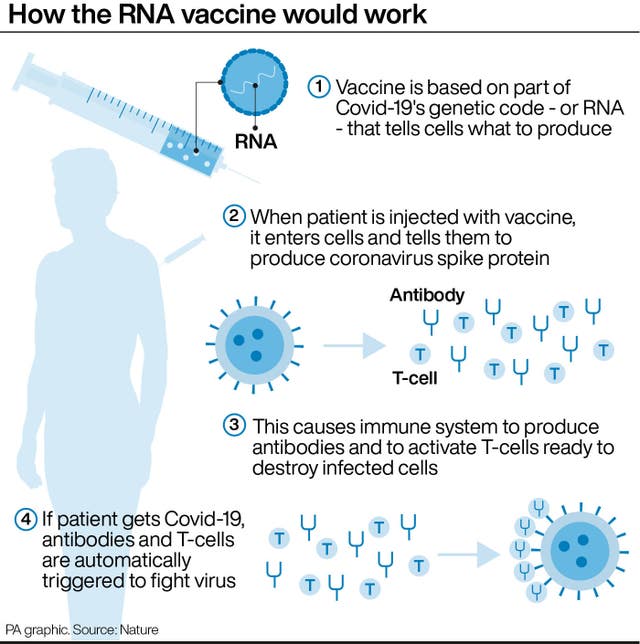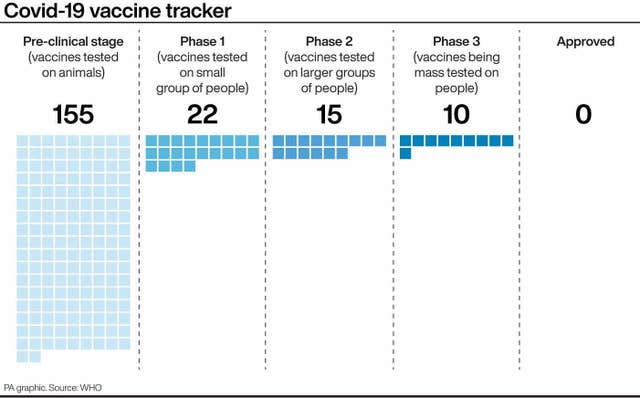The Health Secretary has “confidence” the NHS can deliver an approved Covid vaccine despite the logistics involved, MPs have heard.
The Pfizer/BioNTech vaccine, which provided promising early clinical trial results on Monday, needs to be stored at minus 70C – which could pose transport and storage issues.
Matt Hancock said the distribution of the vaccine – should it be approved by regulators – would be a “huge challenge” due to the low temperatures required for storage.
He also said that rolling out a Covid vaccine to the masses could pose a “mammoth logistical operation”.
Adam Leyton Tweeted: “Matt Hancock on @BBCr4today telling us that the Pfizer COVID vaccine will be manufactured in Belgium and needs to be transported and stored at minus 70 degrees. Let’s hope there’s nothing happening in January that’ll cause huge queues and delays at the ports…”
Comedy news show Have I Got News For You Tweeted: “As Matt Hancock suggests vaccine could be ready for next month, pharmacies prepare to receive one each by late July.”
Commons
Mr Hancock told the House of Commons that the cold chain requirements – a temperature controlled supply chain – mean that the Pfizer vaccine needs to be kept at -70C until “the final hours”.
He added: “Cold chain requirements are significant and do add to the logistical complications, but we have known about that cold chain requirement for many months now so it’s been part of our planning for some time.
“And so we have a good degree of confidence that that will be in place.”
It comes as The Times reported that Pfizer has designed a suitcase-sized container that will keep the doses at -70C for up to ten days.
Each container holds 1,000 to 5,000 doses, the newspaper said.
Mr Hancock also said that from the moment the vaccine leaves the factory in Belgium it can only be taken out of minus 70C four times before it is injected into a patient’s arm.
But it can be stored at a warmer temperature in the two days prior to being used, Mr Hancock said.
This implies that GPs will be able to administer the vaccines two days after deliveries without the need for new refrigeration systems.
Transportation
But transportation of the vaccine from the factory in Belgium to GP practices across Britain could pose a problem.
But one expert said the hurdles could be overcome.
Dr Simon Clarke, associate professor of cellular microbiology at the University of Reading, said on Monday: “There are production and distribution problems to be overcome, but these should not be beyond the wit of human ingenuity.”
Quizzed on the positive results from Pfizer and BioNTech, Mr Hancock told BBC Radio 4’s Today programme: “We haven’t got a vaccine yet, we’re not there yet, but we are one important step closer, and we’ll be ready to deploy it.”
He added: “There’s an enormous challenge of the rollout – we bought doses for 20 million people – 40 million doses in total; it takes two doses 21 days apart (and) it has to be stored until the last few hours before deployment at minus 70C.

“This is going to be a colossal effort to roll this out which the NHS is leading – we’ve been working on it for months in anticipation of this going right.”
Mr Hancock added: “It has to be kept at minus 70C and, crucially, the other trickiness is that it can’t be taken out of minus 70C more than four times – from the moment it leaves the factory gate to the moment that it is injected into somebody.
“For the last 48 hours it is okay to have it at a higher temperature – for it to still be cold in a way that GP surgeries can deliver.
“And in fact, GPs are going to play a huge role in this.”

He said the NHS will be working seven days a week to roll out the vaccine, adding: “A combination of hospitals and core parts of the NHS, having big vaccination sites where people can go to, plus GPs … (also) pharmacists have an important role to play.”
Teams will also be sent to deliver the vaccine to some people, such as those in care homes.
“It is a mammoth logistical operation which the NHS is leading,” the minister said.
The necessity for this temperature of storage also poses problems surrounding the distribution of the vaccine globally.
Some low income countries face significant challenges when transporting vaccines which only need to be stored in refrigerators at 4C – let alone minus 70C.
Dr Charlie Weller, head of vaccines programme at Wellcome, told the PA news agency: “The cold chain that’s needed, that’s going to be a challenge where there are health systems and countries where that cold chain is not set up, or it is not able to be set up in a timely manner.
“So that is going to potentially mean that we need different options, we need a range of vaccines.”
Dr Alexander Edwards, associate professor in biomedical technology at the University of Reading, said: “In general cold-chain distribution and storage is built into the pharmaceutical supply chain – even the shelves on your corner pharmacist will have regular temperature checks.
Dry ice
“But -80 freezing is not routine. However, this temperature does have one unusual advantage- you can distribute on dry ice (frozen carbon dioxide).
“Instead of just being used for fog machines at parties, distribution networks using dry ice will be brought into use for distributing frozen vaccine batches. Care is needed not just to keep the vaccine frozen, but to log temperature to avoid accidental thawing which could inactivate it.
“To bring people into vaccination sites already requires significant coordination- not just someone to give people the jab, but everything from cleaning, through paperwork, to coordinating so people can attend a second injection. Adding ultra-low temperature freezer capacity to this is inconvenient, but is not an insurmountable barrier.”
But Richard Wilding, professor of supply chain strategy at Cranfield University, said: “This is likely to be one of the biggest logistical challenges we have faced this century.
“A successful rapid deployment of any proven vaccine doesn’t just rely on the amount of vaccine that can be produced it relies on multiple factors such as infrastructure, information systems and having a workforce that can administer the vaccine.”
Related: Vaccine chief’s pricey PR firm linked to Dominic Cummings’ father-in-law

